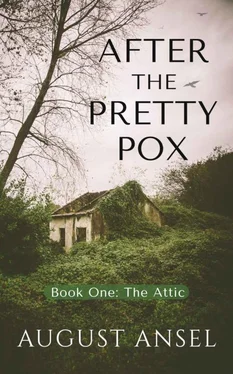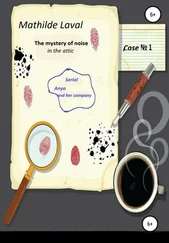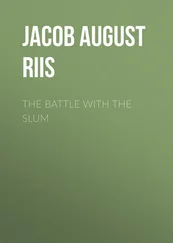Like Granny, she intended to stay.
“NINE HOURS OF DAYLIGHT,” Arie said, scraping a last spoonful of cooked oats from her bowl. “Maybe less, with this weather.” They ate without speaking, only intermittent early birdsong to break the silence—and not much of that, either. The upper panel was thrown open to a barely visible sky, so thick with clouds it was hard to see that the sun had already cleared the horizon. The packs she’d filled during the night sat on the Packard seat like mute sentinels, and the diminished look of the attic was sobering them all.
“Did you stay up all night?” said Renna. She and Handy sat so close they were nearly entwined, as though they couldn’t bear to put an inch of space between them. Arie was glad for it—better to start their journey bonded.
“No, Curran took a watch, too.”
“Not much of one,” he said. “It was practically dawn when you came after me.”
“You needed your beauty sleep.” Arie thought this might get a smile from them, but the weight of their departure hung heavy in the small space. “There’s plenty we need to do before tomorrow,” she said. “Jobs all around. Some of it we can maybe do tonight, but far better if we finish and turn in early.
“I distributed the weightier supplies between you men. Everyone should have some basic items. Handy had some of this in his rucksack, but he needs replenishing. Renna, you’re in charge here.” She laid three wrapped bundles on the floor and unrolled them. “Make them like this,” she said. “One for fire-starting, one for first aid, and one for hygiene. These should stay accessible.”
Curran looked up. “Why not share out the supplies between us?” He pointed at the first-aid bundle. “Why have everyone carrying the same needles, thread, bandages, and…whatever these are,” he said, pointing to a brown bottle of alcohol and one of Indica tincture.
“In case we’re separated,” said Handy. The void of response made the words seem to echo around the attic. “Or someone loses theirs,” he added.
“Handy’s right,” Arie said. “With some things, more is better.” She wrapped the bundles and gave them to Renna. “You’ll need to tear and roll the bandages from this.” She handed her a folded length of soft muslin. “Dry socks in the hygiene bundles—two pair each, along with the soap and clean rags. Add anything else you think you might need, but start there. Once that’s done, go through all the extra bedding and make bedrolls. Granny was a fool for linens, so there’s more than enough—we’ll each have a bed to sleep on tonight, and one tied and ready to go for morning. By the time you’re done with all that, we’ll likely be ready for a noon meal. Use anything still left on the shelves.”
Renna was looking at the packs on the car seat. “Where’s yours?” she said.
“I’ll take care of mine,” said Arie, trying to sound nonchalant. “Don’t forget, I had a jump on it last night.” Renna looked satisfied with the answer, so Arie talked on, not even glancing in Handy’s direction, certain he’d read her face like a book. “Curran,” she said, “your first job is to fit this to Talus.” She held up the makeshift saddlebags. “Better if she wears it most of the day with a small load so it doesn’t take her by surprise tomorrow.”
“She’s been edgy this morning,” he said. “I’ll take her out later, let her run it off with the pack on.”
“As long as she stays close,” said Arie. “Poor thing is probably soaking up our nerves. Before you let her run, though—” She pulled a box from under the table and slid it across the floor to him. “Tarps,” she said, “and a couple of old shower curtains. Figure out rain ponchos. Scissors are on the table. A circle with a hole for the head will work. Make them long enough to keep us dry, but not so long they trip us. You choose the specifics. The heaviest pieces are best saved as ground cover.”
“And us?” said Handy. Arie finally dared to look at him, consciously armoring her face, willing him to see only the same impenetrable countenance she’d thrown at him the first day he showed up. What she saw was like looking in a mirror—the expression plain and blameless, revealing nothing but calm. Brother, aren’t we a pair, she thought.
“I hesitate to say it, but we have to go out,” she said.
“Out where?” said Renna. One hand, like a pale starfish, took hold of the hem of Handy’s shirt.
“Getting outside the bosses’ search grid is paramount,” Arie said. “I know you feel it.”
“We do,” said Curran. “That’s what’s got Talus nerved up.”
“My thinking is this,” she said. “The first couple of days on foot it will be crucial to cover as much ground as possible, and my biggest concern is food. I’ve packed all the jerky, dried berries and beans, everything that travels light and keeps well. The longer it can be made to last, the better. That leaves hunting along the way. Handy’s an excellent mark, but even when hunting is good, stopping long enough to clean and cook it wastes valuable time. Handy and I will go down to the river and make a quick sweep of the snares. My hope is we’ll lay hands on some small game to quick-salt for the road, enough for a day or two.”
“It’s a good idea,” said Handy. “When we get back, Curran and I can take Talus out and make a quick run through some of the houses on this block—see if there are any last supplies that suit us.”
“Good,” said Arie. “I think we can be fully packed and ready for tomorrow before the sun goes down.” She looked up through the open panel at the threatening day. “And maybe before that sky cuts loose on us.”
Curran let Handy and Arie out through the kitchen, and the last thing Arie saw before he closed the door and shoved the fridge back in place was Talus. The dog was already harnessed into her new saddlebags, and Curran was right—her playful side was nowhere in evidence. She watched them intently with her depthless brown eyes, ears alert, hindquarters still.
It was even colder out than Arie had expected. The onshore wind delivered a salty tang of low tide. It came in bitter gusts that nipped at her face and hands and blew a chill up under the hem of Granny’s boiled wool coat. Several seagulls rode the air high overhead, wings still, surfing the current. After checking the street, they hurried toward the path into the gulch, each with a tow sack stuffed under one arm, hands in pockets, shoulders hunched against the wind.
Handy walked a couple of paces ahead of her, and Arie watched with amusement—and a small pang of sorrow—how perfectly matched their stride was, how each time she moved her head to look around her, his head moved in the same direction. She wondered if the younger siblings had been taught Daddy Mack’s woodsing the same way she and the older kids had been, or if their similarities were less nurture and more nature. The wind twisted through the canopy, thrashing treetops back and forth in erratic bursts that were loud enough to discourage conversation. Arie was just as glad. She dreaded the exchange waiting for her, their response when she put her foot down about leaving. But it was Handy’s reaction she dreaded most of all.
Without a word, they veered off to the fish snares, a distinct sense of careful hurry in all their movements. All the snares were sprung, but there was only one fish. Something had gotten to it—probably a bird, judging by the missing eyes and random chunks of flesh pulled out. Handy cut it loose and looked at Arie, a question. She shook her head—there was too much damage. By the time they cut around it, there wouldn’t be enough meat left to justify the extra work. Arie’s impulse was to reset the snares, but she resisted, maintaining a façade of leaving for just a little longer.
Читать дальше













